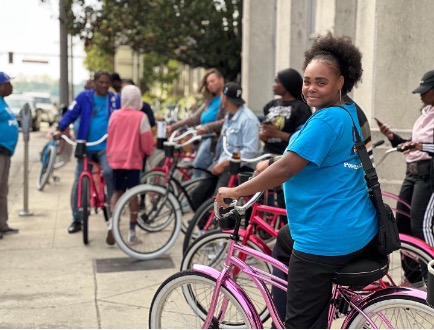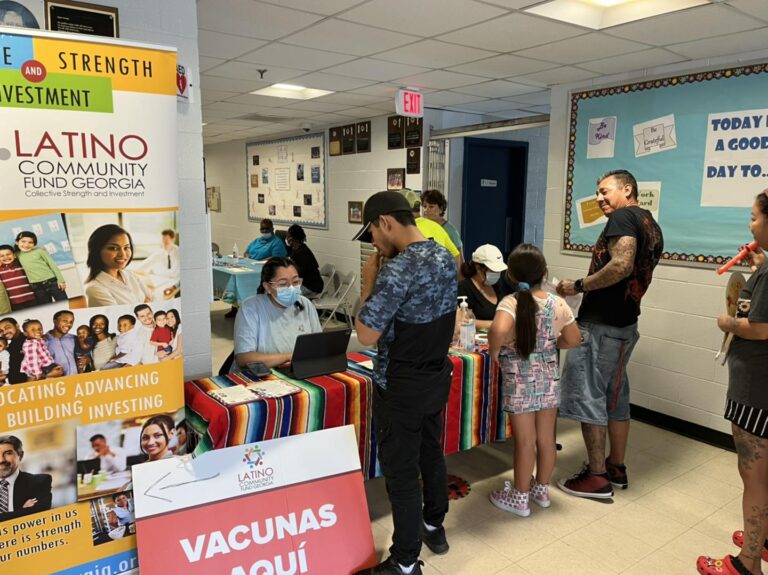
Our Commitment to Racial Equity
Potential is universal. Opportunity is not, particularly in the South.
In a more equitable South, a person’s wellbeing would not be determined by race, sex, sexual orientation, gender identity, national origin, religion, physical ability or class. All people would live in healthy, safe communities, participate in the decisions that affect their lives, and share in the region’s prosperity. Communities, guided by a rich diversity of experience and wisdom, would be strong and resilient.

Racism, however, continues to present barriers to fulfilling potential. Slavery, segregation and a host of laws, policies and practices have entrenched white supremacy, delivering enormous advantages to whites and pervasive disadvantages to people of color. While some of those systems have changed, the vast inequities they created persist in modern-day vestiges: school and housing segregation, sentencing disparities, lending and hiring discrimination, and wealth and homeownership gaps. Structural racism remains a monumental barrier to our mission; it must be dismantled for everyone to realize America’s promises.
We would all benefit from greater equity. A report by the W.K. Kellogg Foundation found closing the racial wealth gap would boost America’s GDP by $8 trillion by 2050, generating more resources to invest in public goods like infrastructure, health care and education. To maximize the contributions and opportunities of people of color, the South’s institutions and systems must be recalibrated. That requires an honest examination of policies and practices to determine who is excluded or disadvantaged, and empowering them to redesign the systems. It demands resources and solutions tailored to specific needs and the elimination of barriers that limit individual opportunity and collective potential. It requires people who look and think differently to listen and learn and seek common cause.
For our part, the Babcock Foundation is committed to infusing equity into our work while continuing some core approaches: centering communities in solutions, helping organizations build their capacity to do more, cultivating innovative partnerships and advancing systems change with long-term resources. We will explore new ways to amplify a broad range of voices and strengthen leaders who reflect the full diversity of the South’s demographics.
We acknowledge philanthropy itself is often a product of systemic social and economic inequalities, and our mission compels us to use all our resources to reduce those disparities. Doing so could mean shifting our internal policies, grantmaking procedures, investment strategies, organizational culture and the small decisions we make every day. We will confront our own personal biases, meet people where they are and hold each other accountable. We will learn by doing.

Photo Credit: Gigi Pedraza
We will also lean on our peers and partners and hope they’ll lean on us, too. We are fortunate to be part of a vibrant network of organizations and coalitions striving for racial equity. As we learn from and with them, we aim to be transparent by communicating our processes, any changes we make and lessons we learn along the way, recognizing we are a work in progress.
We invite you to join us on this journey and share your wisdom as we all strive for a more equitable South.
***
These are a few of the organizations and resources we consulted as we drafted the above statement:
The Business Case for Racial Equity, W.K. Kellogg Foundation
The Color of Law, A Forgotten History of How Our Government Segregated America, Richard Rothstein
“How the G.I. Bill Left Out African Americans,” Demos
“Talking Productively About Race in the Colorblind Era,” the Kirwin Institute
Philanthropic Initiative for Racial Equity
Haas Institute for a Fair and Inclusive Society
The Opportunity Agenda
Center on Budget and Policy Priorities
